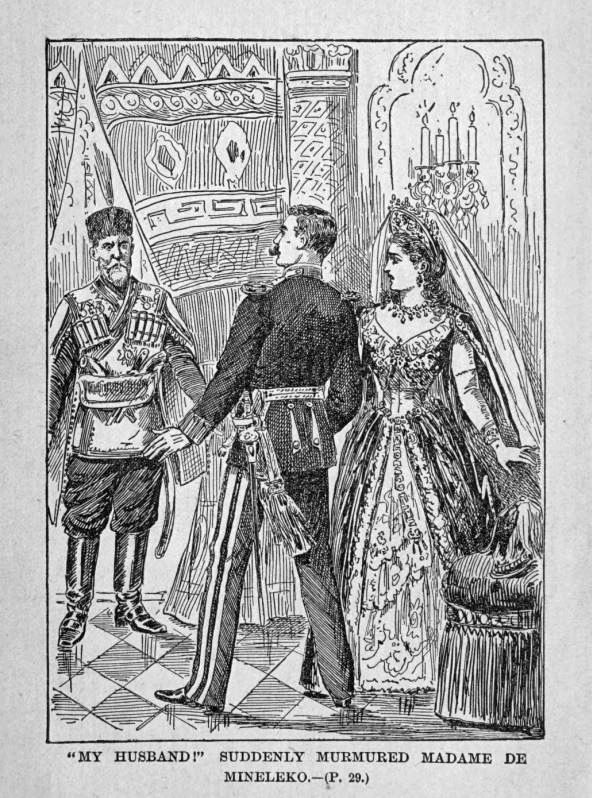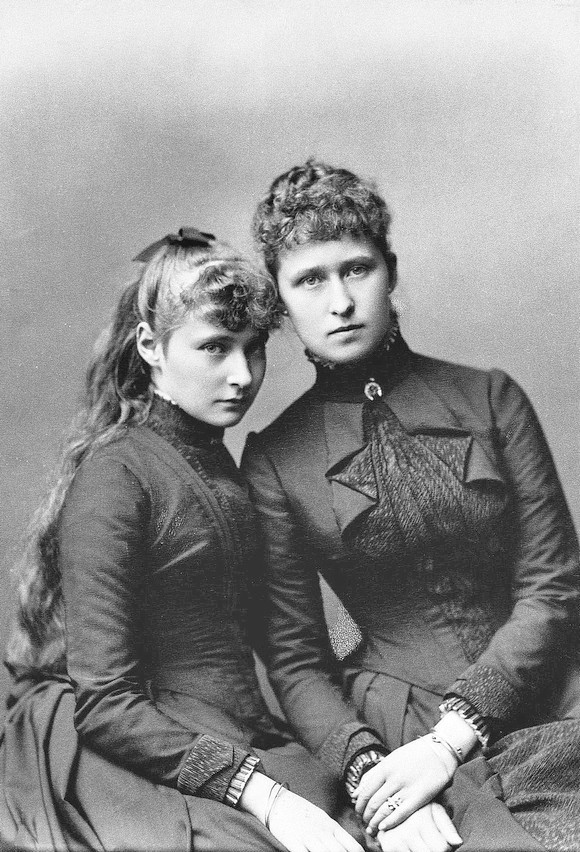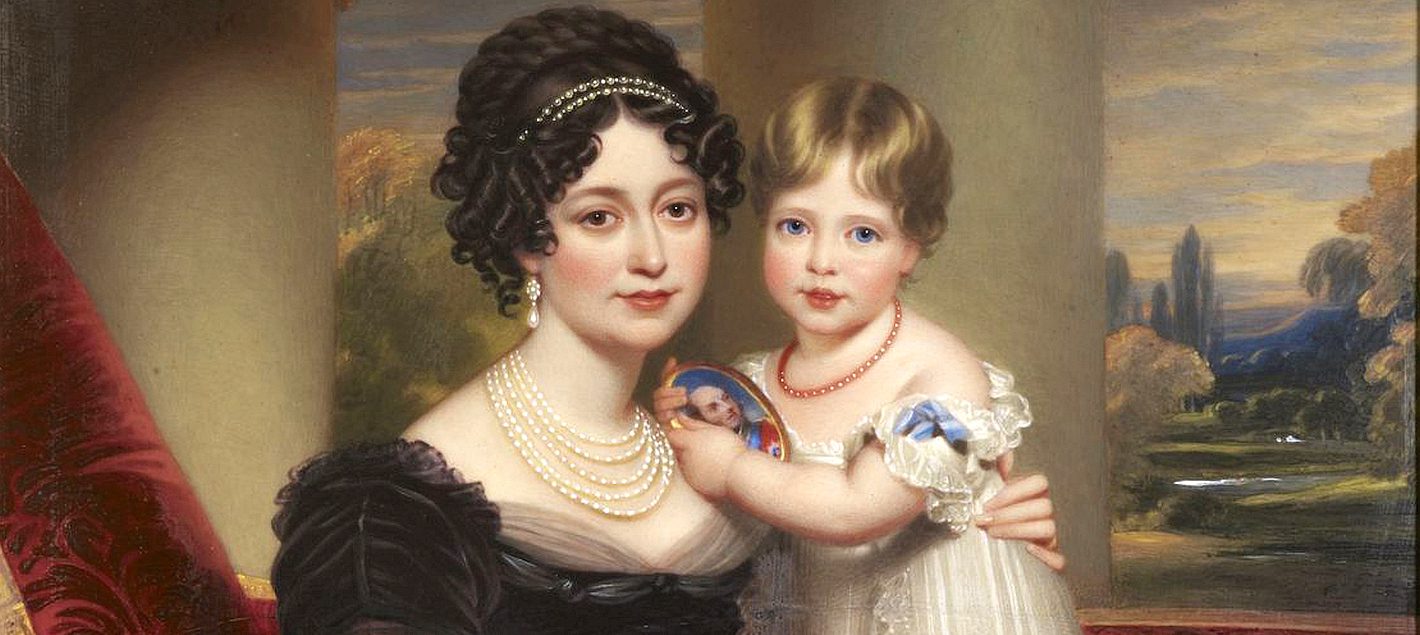In the book “Coburg Darmstadt Windsor” the chapter about Louis Battenberg and Victoria of Hesse also mentions the story of the very short marriage between the Grand Duke Louis IV of Hesse and bei Rhine and Alexandrine de Kolemine is told. In brief the story was as follows (the story is related in more detail in the book):
The Grand Duke’s Secret Wedding
After the death of his wife Alice in 1878 Ludwig IV had been a widower for almost six years when he fell in love with the wife of the Russian ambassador to the Court of Darmstadt. Louis used his good connections to the Russian Tsar to have her husband transferred as ambassadorto Japan while she remained in Darmstadt and obtained a divorce. Queen Victoria was aware of the connection and had already made known her strong dislike of a possible morganatic marriage between her son-in law and a divorced Russian woman. Nevertheless on 30th April 1884 he married her secretly, just on the same day as his daughter Victoria of Hesse and by Rhine married the British Naval Officer Louis Battenberg, originally from Darmstadt.
The Short-lived Marriage
When the news of the secret wedding leaked to the illustrious wedding guests, including Queen Victoria and the Crown Prince of Prussia, who had assembled in Darmstadt for Victoria’s wedding to Louis, their reaction was relentless: Alexandre de Kolemine must leave the country immediately and the marriage be divorced or annulled as quickly as possible. Grand Duke Louis IV was too weak to put up any resistance to the demands of his royal relatives and allowed events to take their course. In the same night his wife, who was after all the new Grand Duchess of Hesse and by Rhine, was removed from her marital bed and taken like a criminal out of the country. This scandalous story was followed with interest and indignation throughout Europe. Alexandre de Kolemine contested the divorce proceedings through all instances, but without success. In the end she received a considerable compensation (some say it was half a million marks) and the title of a Countess of Romrod to keep her quiet.
The book “The King of Thessaly”
Two years later, in 1886, a Franch novel was published called “Le Roi de Thessalie”. In this novel the story of this unfortunate marriage in a slightly disguised form was related. In the same year an English translation was published with the title “The Romance of a German Court”, and in 1890 there was an American translation with the title “Her Royal Lover”. It is interesting to note that a German translation seems never to have been published. The authorities were obviously in a position to prevent this.
The author of the book used the strange pseudonym of “Ary Ecilaw” and this immediately led to speculations as to who the author really was. Up to this day his or her identity remains mysterious.
And who was Ary Ecilaw?
“Le Roi de Thessalie” was not the only book by Ary Ecilaw. In 1885 a book with the title “Roland” was published and in 1886 a further book titled “Une Altesse Impériale” (“An Imperial Highness”), all published by the same Paris publisher Alphonse Lemerre. All three are similar in style; they are about love, passion, beautiful princesses, noble princes and vile traitors in royal courts in fictitious and exotic areas of eastern and south-eastern Europe. Even today these areas hold a certain fascination for us: like the fictitious land of Ruritania or Count Dracula in Transsylvania.

The French literary scholar Charles Le Goffic mentioned in his book, published in 1890, called “Les Romanciers d’aujourd’hui” (“Today’s Novelists”), the name of Ary Ecilaw with the following short remark:
“A pseudonym behind which I do not know who is hidden, but definitely not French, so much is for sure. Ary Ecilaw’s novels are clumsily written and said to be teeming with alleged revelations about the northern courts.” (1)
The story in the book “Le Roi de Thessalie” (“The King of Thessaly” – note the similarity between “Thessaly” and “Hesse”) is about a certain Najeska Ivanovna de Mineleko, wife of the Caucasian Ambassador. “Mineleko” is an anagram of “Kolemine”. Basically it is one of the frequent stories about a beautiful woman whose beauty leads her, (almost) without any fault of her own, to disaster. We know similar novels from this time, such as Thomas Hardy’s “Tess of the d’Ubervilles”, published in 1891 or Tolstoy’s “Anna Karenina” in 1878. It contains all the melodramatic elements: love, ambition, jealousy, a duell, a murder – which is solved only at the end on the deathbed of Najeska Ivanovna’s husband – and the story ends with the demise and premature death of the heroine in a nunnery. A typical cheap novel. The style, if one may say so, appears definitely to be that of a woman, and French, if we are to believe Charles Le Goffic, was not her mother tongue.
When the “Roi de Thessalie” was published people were generally of the opinion that Alexandre de Kolemine herself was Ary Ecilaw. And the remarkable preface of the book, addressed to an “Imperial Highness” would appear to point in this direction:
“Your Imperial Highness will recollect how much we have both been affected by the cruel fate of the heroine of this narrative? If I have desired to relate it thus to the world, it is not merely to prove that that which appears the most improbable is often but too true in life, but in order to demonstrate how, stifling the cries of conscience, wounded vanity and pride, in its demoniacal hideousness, can crush the innocent.
To the great of the earth I dedicate this book, who imagine they have the right to violate the laws even, and forget, in the intoxication of their haughty arrogance, that above them there is one greater than they – God! and that he will measure his justice to them according to the measure that they have meted to their victims.
Marble hearts form ice around them. It is in these mirrors that they must look, in order to see themselves such as they are.
Always and forever thine, madam,
PERM, Siberia, October, 1885 (2)
But why should Alexandrine de Kolemine have wished to revenge herself in this disguised form? The newspapers were anyway full of the sad story of her short marriage and subsequent divorce proceedings in court. Thanks to her own efforts, the facts were generally known and talked about throughout Europe. And what about the other books which had been published under the pseunonym of Ary Ecilaw?
Furthermore, the text contains some rather uncomplimentary remarks about Caucasia (= Russia) which could hardly have been written by the wife of a Russian ambassador. For example, the “Grand Duke Ivan”, fiancé of “Princess Aline” (the reference is to the Grand Duke Serge, later Gouvernor of Moscow and his wife Princess Elizabeth of Hesse and by Rhine) is described as:
“That great dolt, that northern barbarian that they had given her seemed to have in nowise touched the heart or the imagination of the young girl.” (3)
Would the wife of the Russian ambassador write like this about the Tsar’s brother? And there is another consideration: Queen Victoria (“The Empress of Hindostan”) is treated quite favourably despite the fact that she is portrayed as being primarily responsible for the immediate exile and subsequent divorce of Alexandrine de Kolemine. Her love and care for her grandchildren (“The Princesses of Thessaly”) especially after the death of their mother Alice (“Queen Aline of Thessaly”) are mentioned frequently:
“Deprived of their mother at an early age, the royal and charming princesses had received from their grandmother, the Empress of Hindostan, all the devotion and love of which death had bereaved them. This austere woman had for her grandchildren an astonishing tenderness and gentleness. When the late queen, her daughter, had been taken away from her, she had sworn to herself to pour upon those heads all the maternal tenderness that her heart contained; this oath she had fully kept; she loved her children, after the manner of savages without restriction, and without measure.” (4)
Was Ary Ecilaw one of the Darmstadt Princesses?
Whoever the author was, she appears to have been from Darmstadt. The text shows detailed knowledge about Darmstadt, and it is probably more than a coincidence that, even in the original French text many of the characters were given amusing German names. The Mistress of Ceremonies is called “La comptesse de Langweilig” (“Langweilig” means “dreary”), the court dresmaker is a “Fräulein Schafskopf” (“Schafskopf” literally means sheep’s head in the sense of “dull”, “stupid”), the moneylender is called “Schurke” (= “villain”) and Darmstadt is simply “la Residenz Stadt”.Someone obviously had some fun making up these names. The place names also reveal a sense of humour: We already know the Empress of Hindostan; her son, the Crown Prince, is the Prince of Delhi, the Crown Prince of Prussia is the Imperial Prince of Babylon, and the Battenberg family gets the name “Pattenpouff”.
The following description of the Luisenplatz in Darmstadt provides evidence of good inside knowledge:
“Then they filed through the Luisen-Platz with its eight corners, the most beautiful of the city squares. In the middle there arises the “Colonne de Louis,” the most remarkable commemorative monument in the capital, erected to the memory of one of the founders of the dynasty. From a distance, this moument whose total height is thirty-five metres, has the appearence of a tower; it is the Column Vendome of Thessaly. As in that of Paris, one may enter and visit it; if one has the courage to climb the hundred and seventy-two steps of a circular staircase, protected by a simple iron balustrade, he may enjoy there a magnificent panorama.” (5)
And indeed the “Langer Ludwig” (as the monument is called by the Darmstadt residents) is actually 39.15 metres high and has exactly 172 steps.
Ary Ecilaw also describes the little lake near the Kranichstein hunting-lodge, where Prince Louis of Hesse and by Rhine and his wife Alice liked to take a boat ride in their first years of marriage:
“At the Luisen-Wäldchen everybody alighted from the carriage. In the middle of the woods was a large sheet of water upon which swans and wild ducks majestically glided, wrestling with grace and rapidity with the boatmen who, by means of some white oars, were riding in elegant little wherries the amateurs of navigation … Now he [de Mineleko] knew that the king, skillful in all the exercises of the body, was an emerited rower whose passion had been, during the life-time of the late queen, to row during the evening entire hours upon this silent poid. There, listening tenderly to the sweek voice of his companion singing his favorite airs, he rowed slowly and enjoyed the pleasure of the best pastimes that the cares of royalty left him.” (6)
Passages like this led to the theory that Ary Ecilaw was actually the second-eldest Princess of Hesse and by Rhine, Princess Elizabeth, known as “Ella” (and called “Aline of Thessaly” in the book), who at the time of her elder sister’s wedding was already engaged to the Russian Grand-Duke Serge, whom she a few months later married in St. Petersburg and who spent the rest of her life in Russia until she was brutally murdered in 1918. There were also rumours that Ella had taken one or more of Alexandrine de Kolemine’s children into her care and brought them up in Russia. But the passage about the Grand Duke as “that northern barbarian” does not fit in with this theory.
The evidence seems to point to …
In my opinion it seems most likely that Ary Ecilaw was in fact Princess Irene of Hesse and by Rhine, the third daughter of the Grand-Duke Louis IV of Hesse and by Rhine. In 1884 Irene was 17 years old, just at an age when the injustice suffered by Alexandrine de Kolemine and the cowardice of her father must have made an especially strong impression on her. This is also the age at which a princess may take the first literary steps writing melodramatic stories at exotic courts. It is striking that in the whole book “Le roi de Thessalie” this third Hessian daughter is mentioned – as Princess Mathilde of Thessaly – only once in passing, while all her other sisters are mentioned frequently.
But the decisive indication is the name of Ary Ecilaw itself. “Ecilaw” contains “Alice” backwards, which would point of one of Alice’s children. But also “Ary” gives a clue, as “Ary” backwards is “Yra” and “Ira” is the Russian short form of the name “Irene”.

Footnotes
(1) « Un pesudonyme qui cache je ne sais qui, mais point un francais, à coup sur. Gauchement ècrits, les Romans d’Ary Ecilaw fourmillent, dit-on. de révélations sur les cours du nord. » Siehe
https://fr.wikisource.org/wiki/Les_Romanciers_d%E2%80%99aujourd%E2%80%99hui/Romanciers_divers#cite_note-5
(2) Translation from “Her Royal Lover”. The French original: « Vous rappelez-vous, Altesse Impériale, combien nous avons été émus tous deux du sort cruel fait à l’hèroine de ce récit? Si je l’ai voulu conter ainsi à tout le monde, c’est non seulement afin de prouver que ce qui paraît le plus invraisemblable n’est souvent que trop vrai dans la vie, mais pour démontrer comment, étouffant les cris de la conscience, la vanité blessée, l’orgueil, dans sa démoniaque hideur, peuvent broyer des innocents.
Je dédie ce livre aux grands de la terre, qui se croient le droit de violer les lois memes et oublient, dans la griserie de leur arrogance hautaine, qu’au-dessus d’eux il y a plus grand qu’eux: Dieu! et qu’il mesurera sa justice à la mesure de celle qu’ils auront faite à leurs victimes.
Les coers de marbre font glace autour d’eux. C’est dans ces miroirs qu’ils s’y voient tels qu’ils sont.
Toujours pour vous, toujours par vous, Madame, A. E. Perm, Sibérie, Octobre 1885 »
Ecilaw, Ary: Le Roi de Thessalie, 6. Ausgabe. Paris: Alphonse Lemerre, 1886
(3) Translation from “Her Royal Lover”. The French original: « Ce grand butor, ce barbare du Nord qu’on lui avait octroyé, semblait n’avoir nullement touché le coeur et l’imagination de la fillete. » Ecilaw, Ary: Op. cit. S. 134
(4) Translation from “Her Royal Lover”. The French original: « Restées de bonne heure orphelines de mère, les royales et charmantes princesses avaient trouvé auprès de l’Imperatrice des Hindoustans, leur aïeule, tout de dévouement, tour l’amour que la mort leur avait ravis. Cette femme austère trouvait pour ses petits-enfants des tendresses, des douceurs étonnantes. Quand la feue Reine, sa fille, lui avait été enlevée, elle s’était jure de déverser sur ces jeunes têtes tout ce que son coeur renfermait de maternel; ce serment, elle l’avait amplement tenu: ses enfants, elle les aimait à la manière des sauvages, sans restriction, sans mesure. » Ecilaw, Ary: Op. cit. S. 288
(5) Translation from “Her Royal Lover”. The French original: « Enfin, on fila à travers la Luisen-Platz aux huit coins, la plus belle des places de la ville. Au milieu, se dresse la « Colonne de Louis », le plus remarquable souvenir commémoratif de la capitale, élévé à la mémoire d’un des fondateurs de la dynastie. De loin, ce monument a l’air d’une tour dont la hauteur totale est de trente-cinq mètres; c’est la Colonne Vendôme de Thessalie. Comme dans celle de Paris, on peut y pénétrer et la visiter, et si l’on se sent de courage de grimper cent soixante-douze marches d’un escalier circulaire protégé par une simple rampe de fer, on y jouit d’un magnifique panorama. » Ecilaw, Ary: Op. cit. S. 278
(6) Translation from “Her Royal Lover”. The French original: « À Louisen-Wäldchen, tout le monde descendit de voiture. Au milieu du petit bois se trouvait une grande pièce d’eau sur laquelle les cygnes et les canards sauvages glissaient majesteusement, luttant de grâce et de rapidité avec les bateliers qui, moyannant quelques petites blanches, promenaient dans d’élégantes petites nacelles les amateurs de navigation … Or, il [de Mineleko] savait que le Roi, habile à tous les exercices du corps, était un rameur émérite dont la passion avait été, du vivant de la feue Reine, de la promener le soir pendant des heures entières sur cette mare silencieuse. Là, écoutant tendrement la douce voix de sa compagne chantant ses airs favoris, il ramait doucement et goûtait aves délices un des meilleurs passe-temps que lui laissaient les soucis de la royauté. » Ecilaw, Ary: Op. cit. S. 143ff
